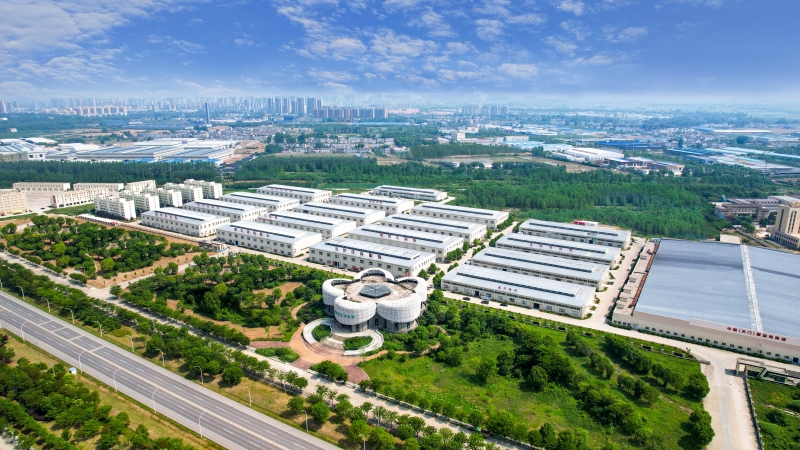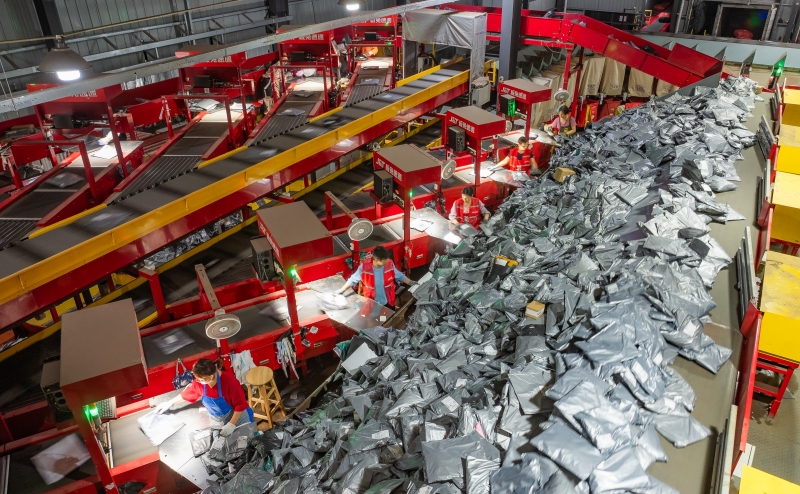Digital-intelligent transformation empowers garment industry in Tianmen, C China's Hubei to weave bright future for e-commerce

Photo shows an aerial view of China (Tianmen) garment e-commerce market, a characteristic garment industrial park in Tianmen city, central China's Hubei Province. (Photo courtesy of the Publicity Department of the Communist Party of China Tianmen Municipal Committee)
Riding the wave of digital-intelligent transformation, the garment industry of Tianmen city in central China's Hubei Province has leveraged its innovation-driven exploration in e-commerce and in-depth upgrading across the entire industrial chain, achieving a successful shift from traditional manufacturing to digitalized, international operations.
In 2024, the city's garment businesses created an e-commerce transaction volume of more than 51.3 billion yuan ($7.14 billion), with over 600 million garments sold globally—both figures marking year-on-year increases of more than 25 percent.
At the heart of this boom are characteristic garment industrial parks including the China (Tianmen) garment e-commerce market and Tianmen Baima garment base, where high-tech operations and creative entrepreneurship forge a powerful synergy.
In one corner of the 3,000-square-meter modern warehouse of the China (Tianmen) garment e-commerce market, a post-80s entrepreneur named Xiong Feixiang zipped through rows of merchandise on an electric self-balancing scooter.

A livestreamer promotes garments via livestreaming in Tianmen city, central China's Hubei Province. (Photo courtesy of the Publicity Department of the Communist Party of China Tianmen Municipal Committee)
Behind him, floral print dresses moved down automated lines, where they were sorted and packed with precision before being shipped overseas via air logistics.
At the same time, more than 50 livestreamers working for Xiong's company promoted the latest styles on online platforms such as Douyin, Kuaishou, and TikTok, connecting Tianmen-made products with consumers across the globe.
This was the epitome of Tianmen's flourishing garment industry.
"An order that used to take three days can now be completed in just four hours," said Chen Jianbo, the production manager of a Tianmen-based garment company. "Our smart-response system has boosted production efficiency nearly twentyfold."

Photo shows the intelligent production workshop of Yongjia garment Co., Ltd., a garment company based in Tianmen city, central China's Hubei Province. (Photo courtesy of the Publicity Department of the Communist Party of China Tianmen Municipal Committee)
Inside the intelligent workshop of the company, cutting-edge technologies have revolutionized the production process.
An intelligent hanging system embedded with Internet of Things (IoT) chips collects real-time data on over 200 production parameters, a digital twin factory mirrors real-time operations, and an artificial intelligence (AI)-powered scheduling system processes customized orders from cities like New York, Bangkok, and Dubai simultaneously.
As the first city on the Jianghan Plain in Hubei to achieve fully automated parcel sorting, Tianmen has built an efficient, low-cost logistics network that underpins its e-commerce success.
Logistics costs per item are kept between 1.4 yuan to 1.9 yuan in Tianmen, the lowest in Hubei Province. The city is now capable of handling over 1 million parcels per day, with express delivery volumes soaring 63 percent year-on-year to reach 300 million parcels in 2024.

An automated parcel-sorting line runs at full capacity in Tianmen city, central China's Hubei Province, dispatching over 200,000 pieces of garments across the country. (Photo/Xu Lei)
Dedicated freight lines connect Tianmen with major logistics hubs of the country like Guangzhou in south China's Guangdong Province and Hangzhou, capital of east China's Zhejiang Province, ensuring efficient delivery and enhanced competitiveness for local e-commerce players.
Strong government support, including subsidies of up to 10 million yuan for intelligent transformation, special logistics incentives for e-commerce firms, and one-time entrepreneurship grants for entrepreneurs who return to their hometowns to start businesses, has significantly fueled the rise of the city's garment industry.
Today, Tianmen is home to over 6,800 garment-related companies, nearly half of which are engaged in e-commerce.
In an effort to support garment enterprises in joining forces for collective development and further boost the global competitiveness of its garment industry, Tianmen has launched a regional public brand—TMYS—with unified design, production, and quality control standards.
Products under the brand are now sold in many countries and regions.
Looking ahead, Tianmen plans to continue integrating digital technologies with traditional manufacturing to build a more competitive modern textile and garment industrial cluster, said an official of the city.
Photos
Related Stories
- China's garment industry logs revenue, profit growth in Jan.-Aug.
- Stories of China's high-quality development | China links its most remote communities to digital world
- Northeast China driving digital transformation
- Chinese SMEs ride digitalization wave
- Intel CEO calls for joint efforts to drive digital transformation, build sustainable future
- China's major coal-producing province accelerates digital transformation
- Chinese electronic signature industry on fast track
- Digital transformation in energy sector gives boost to green, low-carbon development
- China’s manufacturing sector gathers speed on road to digital transformation
- Manufacturing enterprises in Zhejiang benefit from digital transformation
- Saudi Arabia to cooperate with Chinese firms over digital transformation
Copyright © 2025 People's Daily Online. All Rights Reserved.









